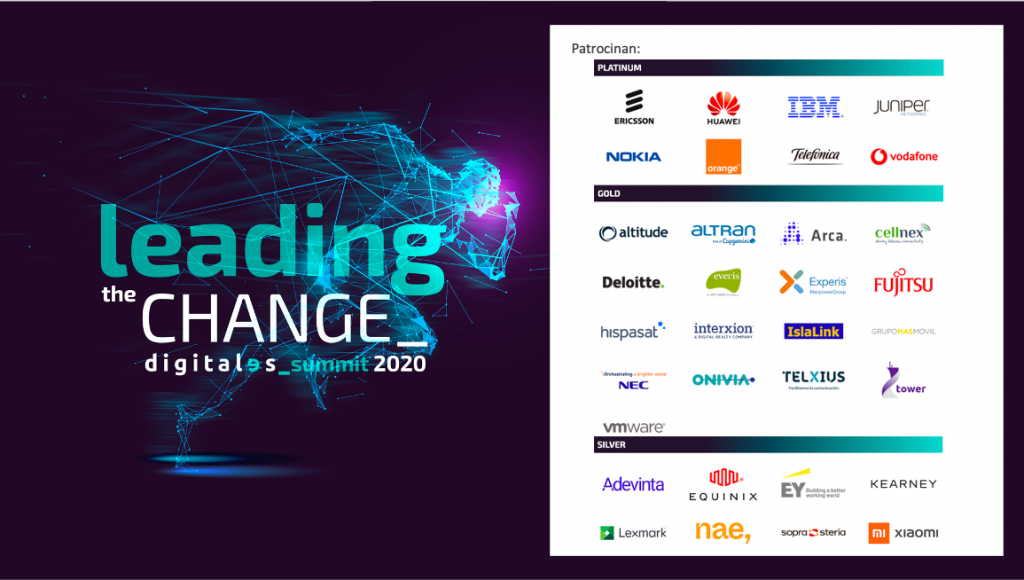23/07/2020
More than 50 speakers, 6 round tables, 4 dialogues and up to 3 days of debates on current technological issues. The DigitalES 2020 Summit will have the highest institutional support and will premiere a ‘phygital’ format where the digital and physical universe meet, in line with the times we live in, and where solidarity and sustainability will play a more relevant role than ever.
But… what will be discussed in the debates that will bring together the main leaders of the leading companies in the sector? What are the issues that will focus the attention of the guests at the event?
Six are the topics that will mainly group the conversation: reconstruction of Spain; Education and Employment; Green Deal; Telecommunication Infrastructures; 5G and Artificial Intelligence. Issues that are on everyone’s mind and that have gained special prominence in this turbulent 2020.
Economic reconstruction is on everyone’s lips following the recent pact reached by the European Union to boost the post-covid economy. We could be facing the worst depression since the 1930s and, as Alicia Richart, CEO of DigitalES, argues, the solution must be a stronger, more sustainable and more digital Europe.
How can companies help? What support could the Spanish government find in the technology industry? What new foundations need to be built? These will be some of the issues to be addressed at a round table with the participation of executives from Accenture, Altran, Deloitte, Fujitsu and IBM, among others.

The coronavirus has changed the history of education, forever transforming the education system through digitalization. Spain is above the European average in the percentage of schools with computers, tablets and high-speed Internet (68% compared to 53% in Europe), but we still need to improve in digital skills.
Likewise, the provision of effective education has been a priority for Spain in the last decade, recognizing the need to align the skills of the workforce with the ever-changing needs of the economy. How can innovation in education mitigate job losses from the impending wave of automation?
How can we ensure that the same labor protections that exist today apply to new forms of work, such as zero-hour contracts? And how can we incorporate initiatives in the public sector as well, to ensure that we create ecosystems where learning is enhanced and accelerated? Experts from companies and institutions will talk about all this during the second round table of the event.

Wednesday, September 9 will kick off with a highly anticipated and topical debate: the so-called «green transition» or «Green Deal». Digitization is also synonymous with sustainability and the ICT sector is already playing an enabling role in this movement.
At the same time, the climate impact of the ICT industry is expected to increase rather than decrease. Is the ICT sector the solution or the problem? How could digital policy help accelerate the green transition in other sectors? What is the Spanish ICT industry doing to lead the EU’s goal of being carbon neutral by 2050?
The rise of infrastructure will be the focus of the fourth major debate at the Summit. The technology sector requires enormous infrastructure development over the next decade. The construction of small cells, data centers, fiber optic networks, submarine cabling, broadcast towers and cloud storage must be accelerated.
The most obvious case has been the recent deployment of submarine cable networks in Asia and Africa. What role could telecom mergers and state aid for broadband play in encouraging private sector investment? Are high yields sustainable? And how can the right balance be struck between a consumer-friendly telecommunications policy and the promotion of network investments?

Few topics generate as much expectation and interest as Artificial Intelligence, the subject that will open the debates on the last day of the Congress. In a round table with the participation of members of the European Commission and the Massachusetts Institute of Technology (MIT), as well as leaders of leading Spanish companies in the sector.
Digital marketplaces are flourishing thanks to innovation in customer experience and a number of cost-effective tools that are now available, such as fraud detection, real-time optimization, sentiment analysis and advanced marketing solutions. Can these markets provide personalized services while ensuring respect for European values of non-discrimination? Should tax policy be rethought to level the playing field for digital markets?
Finally, the Summit will analyze the competitiveness, reliability and productivity of 5G networks, in a debate in which executives from companies such as Huawei, Nokia, Ericsson, Cellnex, Arca and Juniper Networks will participate.
5G is predicted to add $13.2 trillion to the global economy by 2035. But… what incentives are needed to accelerate 5G adoption in strategic sectors such as manufacturing, healthcare or automotive? How can we the increased productivity and efficiency expected from Industry 4.0?

The event, which can be followed on social networks with the hashtag #DigitalES2020, will also have a very special slogan, ‘Leading the Change ‘, which will act as a common thread for all discussions. The round tables will also include presentations by prominent institutional, academic and business speakers.
Full agenda of the event: here










